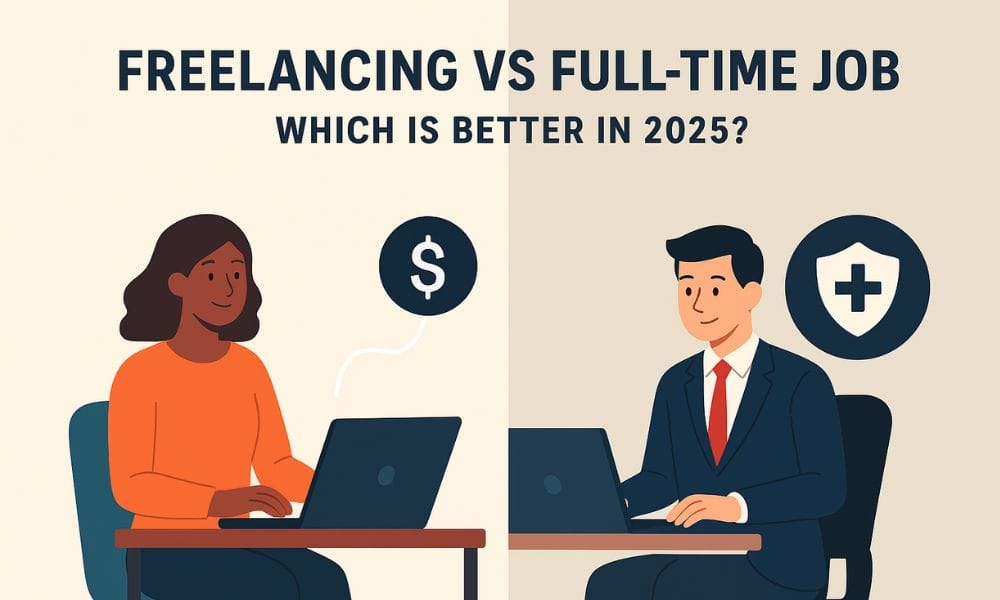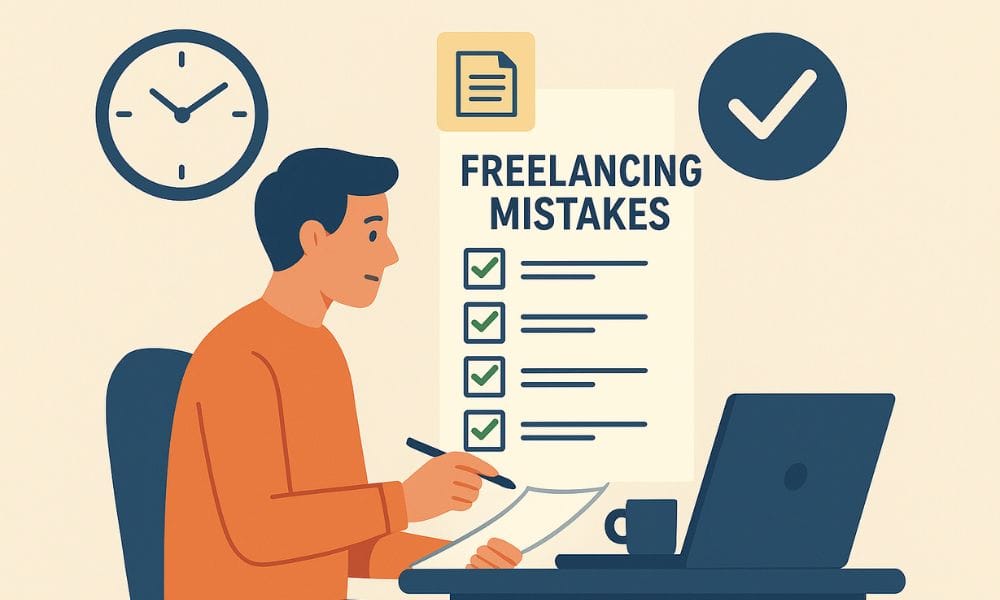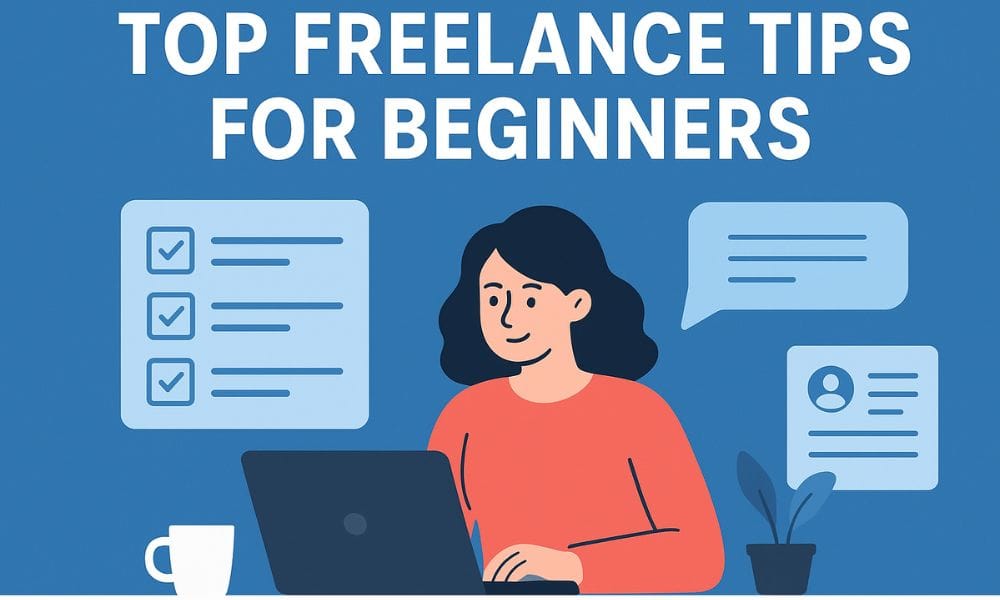The work world has changed. More people are asking whether a freelancing vs full-time job career makes more sense for their lifestyle, goals, and income in 2025.
Remote work, digital tools, and new online platforms have made freelancing more accessible than ever. But full-time jobs still offer security and structure that many professionals value.
If you’re wondering which path is right for you, this article breaks down the pros, cons, and realities of both so you can make a confident decision. You can also check out our Complete Guide to Freelancing for a step-by-step overview of how to get started.
1. What Is Freelancing?
Freelancing means working independently rather than being employed by one company. You choose your projects, clients, and work schedule. In today’s world, freelancers include designers, developers, writers, marketers, and even consultants who offer specialized services.
Unlike traditional employment, freelancers are their own bosses. They decide when and how to work, giving them the freedom to manage their own careers.
If you’re thinking about starting as a freelancer, our article on Top Freelancing Skills to Learn in 2025 can help you build the right foundation.
2. What Is a Full-Time Job?
A full-time job means working for one employer on a fixed schedule — typically 35–40 hours a week. You receive a salary, benefits, and sometimes bonuses. The trade-off is less flexibility but more stability.
Many people choose full-time roles for the predictable income, health insurance, and team collaboration. Companies are also evolving, offering hybrid options that allow employees to work from home part of the week.
If you want to explore how full-time roles are evolving, you can visit Indeed Career Guide for up-to-date career insights.
3. Freelancing vs Full-Time Job: The Key Differences
When comparing freelancing vs full-time job, it’s not just about income — it’s about lifestyle, control, and priorities.
Here’s a simple breakdown of how they differ:
| Aspect | Freelancing | Full-Time Job |
|---|---|---|
| Income | Can fluctuate month to month | Steady and predictable |
| Flexibility | Work from anywhere, anytime | Fixed hours and routine |
| Security | No guaranteed paycheck | Consistent salary and benefits |
| Growth | Build your brand and set your rates | Promotions within company |
| Workload | You choose projects | Assigned by employer |
| Independence | Total control | Work under management |
Understanding these differences helps you see where your priorities fit best.
4. Advantages of Freelancing
Freelancing comes with big advantages for people who value independence. Here’s why many professionals are making the switch:
- Freedom of time and place. Work whenever and wherever you want.
- Unlimited income potential. Your effort and skill determine your earnings.
- Diverse experience. You can work with clients from different industries.
- Creative control. You choose which projects excite you most.
Freelancers often find more personal satisfaction because they get to shape their careers. To learn how to attract consistent projects, read our post on How to Find and Keep Freelance Clients.
5. Advantages of a Full-Time Job
A full-time job still offers benefits that freelancing doesn’t. Here are a few reasons people prefer traditional employment:
- Financial stability. You receive a steady paycheck every month.
- Employee benefits. Benefits like medical coverage, savings plans, and paid leave can make full-time roles feel more secure and predictable.
- Structured environment. Clear goals and expectations from day one.
- Team collaboration. Working with others can enhance learning and motivation.
Full-time jobs provide consistency, which helps many professionals plan long-term. For career-related insights and salary data, visit Forbes Careers.
6. Challenges of Freelancing
While freelancing sounds appealing, it’s not without its challenges.
- Irregular income. Workload and payments can vary month to month.
- Finding clients. You’re responsible for your own business development.
- Taxes and expenses. You must manage your own taxes, insurance, and tools.
- Discipline required. Without a boss, you have to stay motivated.
These are manageable with time and strategy. Our guide on How to Set Freelance Rates can help you balance earnings and workload effectively.
7. Challenges of Full-Time Jobs
Full-time work also has its downsides. Many professionals find themselves limited by:
- Lack of flexibility. You work set hours, even when productivity varies.
- Limited control. You don’t choose your projects or clients.
- Office politics. Navigating team dynamics can be stressful.
- Dependence on employer stability. Layoffs or restructuring can affect your job security.
If creativity and independence drive you, freelancing might be more fulfilling.
8. Which One Fits You Best?
Choosing between freelancing vs full-time job depends on what matters most to you.
Ask yourself:
- Do I value stability more than flexibility?
- Am I comfortable managing my own time and finances?
- Do I prefer a team environment or independent work?
If you like predictable routines and clear career paths, full-time work might suit you. But if you want freedom and control, freelancing could be a better match.
9. Combining the Two: Hybrid Careers
You don’t always have to choose one side. Many professionals now mix both worlds — working full-time while freelancing on the side or switching between the two during their careers.
Hybrid careers offer:
- A steady income plus extra freelance earnings.
- Room to explore new industries.
- Smooth transitions between employment and independence.
In 2025, this approach is more common than ever. It’s a great way to test whether freelancing fits your lifestyle without giving up your main job.
FAQs About Freelancing vs Full-Time Job
1. Is freelancing better than a full-time job?
It depends on your goals. Freelancing offers flexibility and freedom, while full-time jobs provide stability and benefits.
2. Which pays more: freelancing or full-time jobs?
Freelancing can pay more, but income fluctuates. Full-time jobs offer a consistent salary.
3. Can I freelance while working full-time?
Yes, as long as your employer allows it and you manage your time well.
4. Is freelancing risky?
It has risks, especially early on, but planning and good client management reduce them.
5. Which is better for beginners?
Starting with a full-time job helps build experience. Then you can freelance with confidence.
6. How do I switch from a full-time job to freelancing?
Start small — build your portfolio, find clients, and transition gradually. Our Complete Guide to Freelancing can help.
Final Thoughts
When it comes to freelancing vs full-time job, there’s no one-size-fits-all answer. Both have rewards and challenges — what matters most is your personality, goals, and tolerance for risk.
If you crave freedom, creative control, and flexibility, freelancing might be your path. If you value structure, teamwork, and stability, a full-time job could be better.
And if you’re still unsure, try a hybrid approach. The good news is, in 2025, you have the freedom to choose — or even combine both.
For more on growing your freelance career, check out our Complete Guide to Freelancing and Best Freelance Platforms.



